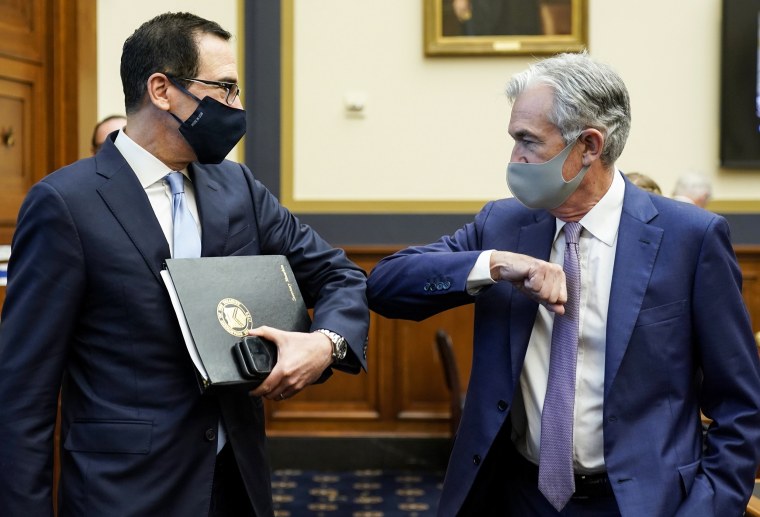In testimony before the House Financial Services Committee on Tuesday, Federal Reserve Chairman Jerome Powell and Treasury Secretary Steven Mnuchin touted the economic progress the country has made. Both also stressed that two key factors would be necessary to keep the momentum going: Another stimulus package from Congress, and a vaccine — neither of which currently exists.
“The path forward will depend on keeping the virus under control, and on policy actions taken at all levels of government,” Powell said in his prepared remarks ahead of a question-and-answer session with committee members.
“I think Powell is stepping up the rhetoric a little bit,” said Willie Delwiche, investment strategist at Baird. “He is being more vocal… that the Fed will continue to do what it can do. But what it can do isn't as great as what Congress could do via fiscal policy,” he said.
Powell was pressed to account for the dearth of loans made through the Fed’s Main Street Lending Program by lawmakers including Committee Chairwoman Maxine Waters, D-Calif., who called the paucity of loans “unacceptable.”
The Fed attempted to expand the program’s reach in June when it lowered the minimum loan threshold from $500,000 to $250,000, and Waters asked if that minimum could be lowered further. Mnuchin said he would support lowering the minimum to $100,000, but Powell said the program had generated little interest in borrowers seeking less than $1 million.
The Main Street program is one of 13 different Fed programs launched since the advent of the pandemic to provide liquidity to various sectors of the market, but the Fed’s toolbox has limitations. Powell and Mnuchin both emphasized the need for Congress to come together and agree on a plan for more fiscal stimulus. “A targeted package is still needed,” Mnuchin said.
Analysts took a dim view of this prospect, following the death of Supreme Court Justice Ruth Bader Ginsburg and what is shaping up to be a bitter fight in Washington over her successor coming just before the election.
“Much of the oxygen for additional fiscal stimulus has been consumed by the news over the weekend of an impending Supreme Court battle,” Delwiche said.
Powell emphasized that 11 million jobs remain lost, a figure that represents more displaced workers than the entirety of the financial crisis.
“Now, with the Supreme Court becoming the political football, the likelihood of a deal on another fiscal package geared toward the coronavirus and its impact is at best delayed, if not more uncertain,” said Keith Buchanan, portfolio manager at Globalt Investments.
As a result, Buchanan said, the nonchalance the market had assumed towards partisan wrangling is fading, as the prospect of a longer-running stalemate becomes increasingly likely. “The market now has more concerns about risk,” he said, especially as the jobless rate remains high.
Although the ranks of the unemployed have fallen sharply since the early days of the pandemic, Powell emphasized that 11 million jobs remain lost, a figure that represents more displaced workers than the entirety of the financial crisis — which until Covid-19 struck, represented the greatest labor market shock in modern history.
“For a sustainable recovery, we need more income, so it’s either more jobs or more direct payments from Congress,” Delwiche said — adding that more stimulus would be only a temporary respite. “To see sustained recovery, we need to see sustained improvement in the job market,” he said.
In his comments, Powell articulated the risks of a stall in the labor market recovery, warning lawmakers that over time, families will run through their cash cushions until their ability to spend, to buy necessities and even stay in their homes is at risk. From there, “It’s very hard to have any certainty about the path forward,” he said.
For lower-income households, financial experts say that path is even more tenuous. “Even with the last three or four months of bounce-back, I think the fullness of the recovery hinges on having blue-collar workers participate in the recovery as quickly as possible,” Buchanan said.
“Chair Powell talks a lot about the inequities in the economy [and] I think the pandemic has kind of lifted the veil on inequities,” he said. “That’s a huge problem… we have to try to consider going forward.”
